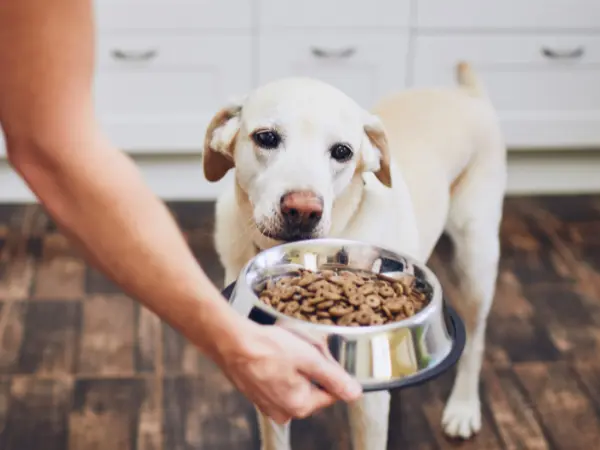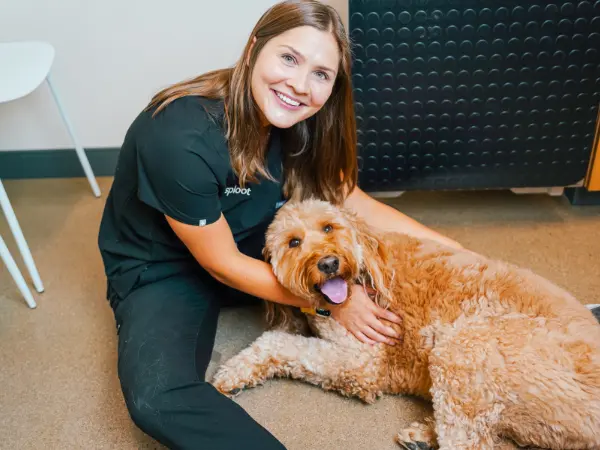Many pet parents ask, “Can dogs get the flu?” And the answer is yes. If your dog is coughing, sneezing, lethargic, or experiencing a fever, these could be canine influenza symptoms, prompting the need for a vet visit and treatment.
In this Sploot Vets guide, we talk about dog flu symptoms, canine influenza treatment, and when to protect your dog with the canine influenza vaccine.
Overview:
- Dogs can get the flu, and certain seasonal lifestyle factors may increase their risk.
- Typically, humans cannot transmit the flu to dogs, except for very rare strains.
- Dogs can get dog flu from other dogs, cats, or humans (if the virus clings to human clothing or skin.)

I. Canine Influenza (Dog Flu) Basics
a. What Is Canine Influenza or Dog Flu?
Canine influenza, also known as dog flu, is a transmissible disease caused by two strains of Canine Influenza Virus (CIV):
- H3N2 CIV (more common) – this strain of canine influenza originated from an avian (bird) flu virus from Asia and was introduced to the US in 2015.
- H3N8 CIV (less common) – this strain of canine influenza originated from horses and was first identified in dogs in 2004.
Note: Both of these strains produce similar canine influenza symptoms. While H3N8 is far less common, canine influenza vaccines are typically bivalent, protecting against both strains.
b. Is There a Flu Season for Dogs
No, there is no official flu season for dogs. However, certain seasonal lifestyle changes may increase the risk of canine influenza. Any season with increased pet socialization or dog boarding can potentially lead to more cases of canine influenza.
Here’s how each season can carry risks in different ways:
- Spring and summer – typically seasons for outdoor activities. Dogs going to shared spaces or socializing with other pets are at risk of getting canine influenza.
- Fall and winter – typically seasons for indoor gatherings, socialization, and dog boarding. These seasons present added risks regarding canine influenza.
b. Can Dogs Get the Flu from Humans?
If a pet parent is down with the flu, they might wonder, “Can I pass my flu to my dog?”. The good news is this typically does NOT happen.
Even though people can also get sick from influenza viruses labeled H3N2 and H3N8, the human and canine strains are species-specific. This means the H3N2 and H3N8 strains that affect humans typically do not affect dogs (even if they are labeled similarly).
Note: The only exception is Influenza H1N1 (or swine flu), which can be transmitted from humans to dogs. However, in these rare cases of human-to-dog transmission, symptoms are typically absent or mild for dogs.
c. Can You Catch The Flu from Your Dog?
The risk of catching the flu from a dog is very low. Canine influenza typically does not affect humans. To date, there are no reported cases of this. However, influenza viruses can change rapidly, so proper hygiene practices are always recommended.
II. Dog Flu Symptoms: How to Tell If Your Dog Has The Flu
Because this viral infection targets the respiratory system, most of the canine influenza symptoms reflect this. The following are the most common canine influenza symptoms to watch out for:
- Coughing in dogs
- Sneezing in dogs
- Nasal and eye discharge
- Fever (temperature higher than 102.5°F or 39.2°C)
- Lethargy and loss of appetite
- Dog eye infections
a. Can A Dog Survive Canine Influenza?
Typically, canine influenza or dog flu is NOT life-threatening. Many dogs recover within 2 to 3 weeks, especially if they are otherwise healthy and receive appropriate supportive care, as instructed by a veterinarian.
However, puppies, senior dogs, and dogs with compromised immune systems have a higher risk of more severe secondary complications from canine influenza, such as bacterial pneumonia or bronchitis. For these dogs, close monitoring is advised, and be sure to have the contact information of an urgent care veterinarian in case symptoms worsen.
b. Will Canine Influenza Go Away On Its Own?
Canine influenza can go away on its own in some cases. However, it’s always best to contact a veterinarian, even if symptoms seem mild.
In addition, we highly recommend going to an urgent care veterinarian or emergency vet if you see the following severe symptoms:
- Persistent or worsening cough (lasting more than a week)
- Shows labored or rapid breathing
- Refuses food or water
- Has a high fever (equal to or more than 103°F or 39.4°C)

III. Canine Influenza Treatment
a. Supportive Care for Mild Cases of Dog Flu
If a dog is otherwise healthy and the symptoms of canine influenza are mild, veterinarians may recommend the following supportive care tips:
- Rest & Isolation – Keep your dog separated from other pets for at least 2–3 weeks to prevent the spread of the virus and allow recovery time. Your veterinarian can help you determine if it’s safe for your dog to interact with other pets again.
- Hydration – Make sure your dog has access to fresh water at all times; dehydration can worsen symptoms and delay recovery. You can also try adding water to your dog’s food if they aren’t drinking enough water on their own.
- Nutrition – Encourage eating; if your dog’s appetite is low, try offering warmed wet food for dogs or bland options like boiled chicken and rice.
- Medications (if prescribed by the vet) – Your vet may prescribe cough suppressants, anti-inflammatories, or antibiotics, depending on your dog’s flu symptoms.
b. Urgent or Emergency Care for Severe Dog Flu Cases
If your dog develops severe dog flu symptoms, they may need urgent or emergency vet care. Here is a breakdown of the required canine influenza treatment for each symptom:
1. Persistent Or Worsening Cough (More Than A Week)
This symptom may signal pneumonia or another secondary respiratory infection. An urgent care veterinarian may recommend chest x-rays and prescribe antibiotics as needed.
2. Shows Labored Or Rapid Breathing
This severe canine influenza symptom could indicate lung inflammation or fluid buildup, caused by the virus or a secondary infection. An emergency veterinarian may recommend oxygen therapy, IV fluids, and hospitalization in severe cases.
3. Refuses Food Or Water
If a dog with canine influenza refuses food and water for a prolonged time (12 to 24 hours), this can lead to life-threatening dehydration and is also a sign that the infection is severe. An urgent care veterinarian may recommend subcutaneous or IV fluids, appetite stimulants, and supportive nutrition.
4. Has A High Fever
A high dog fever equal to or more than 103°F (39.4°C) suggests that the canine influenza infection is severe and may need further treatment. An urgent care veterinarian may recommend IV fluids and medication to lower the fever (antipyretics).

IV. Canine Influenza Vaccine: Schedule & More
The canine influenza vaccine protects dogs from contagious respiratory infections caused by H3N2 and/or H3N8 dog flu strains. This is a non-core vaccine, meaning it’s recommended based on a dog’s lifestyle and exposure risk.
In the U.S., most veterinarians use the bivalent version of the vaccine, which covers both strains in one vaccine. (Monovalent versions are also available and used in certain cases.)
Note: This vaccine is NOT to be confused with the parainfluenza dog vaccine, which protects against a different respiratory virus, and is part of the DHPP or DAPP dog vaccine.
a. Does My Dog Really Need A Canine Influenza Vaccine?
It depends on your situation. Not every dog needs the canine influenza vaccine, but many benefit from it. Your veterinarian can assess your dog’s risk based on lifestyle and location.
Dogs that visit boarding facilities, doggy daycare, or dog parks regularly are at higher risk of exposure and can benefit more from the canine influenza vaccine’s protection.
In addition, some dog boarding or doggy daycare facilities require proof of canine influenza vaccination before accepting a dog. If you’re planning to bring your dog to establishments like these, make sure to check their requirements in advance.
b. How Often Should My Dog Get The Vaccine? [Canine Influenza Vaccine Schedule]
Most dogs that are 3 months or older can already be given the canine influenza vaccine. The vaccine series begins with two doses, given 2–4 weeks apart, followed by annual or yearly boosters.
If your dog hasn’t been vaccinated before or hasn’t had an annual booster in a while, schedule the first dose a month or more before boarding, travel, or busy social seasons to ensure they are fully protected.
c. Is The Dog Flu Vaccine Beneficial in Colorado?
The canine influenza vaccine is highly valuable in Colorado, where there are numerous dog-friendly destinations, dog-friendly events, and other social environments for dogs. Canine influenza outbreaks can occur at any time of year, especially in shared, dog-friendly spaces.
Note: The vaccine helps lower the risk of secondary infections that may occur after a dog contracts influenza, offering broader protection (possibly among other vaccines) during outbreaks or increases in canine respiratory illness (e.g., 2025 case)
All in all, the canine influenza vaccine provides an added layer of protection for your dog and the rest of the community. This is why many dog boarding and doggy daycare establishments in Colorado require this vaccine.
d. Is The Dog Flu Vaccine Beneficial in Illinois?
In Illinois, particularly the Chicago area, the canine influenza vaccine is strongly recommended due to a high concentration of social dogs within the area. With many indoor dog daycares and dog-friendly establishments, viruses, including the canine influenza virus, can circulate at any time of the year. The canine influenza vaccine helps reduce both the severity and spread of the disease among local pets.

Final Thoughts on Canine Influenza or Dog Flu
This wraps up our guide on dog flu or canine influenza. In the above sections, we’ve confirmed that dogs can, indeed, get the flu, and we discussed the canine influenza symptoms to look out for. We also talked about the benefits of the canine influenza vaccine..
As a final reminder, while the canine influenza vaccine is considered a non-core vaccine, it is still highly recommended for certain areas and lifestyles. If you’d like to find out if it’s beneficial for your dog, consult a trusted veterinarian!
Sploot Vets: All-in-One Veterinary Care You Can Count On
At Sploot Vets, we’re here to keep your dog healthy and happy year-round. Whether your dog has canine influenza symptoms, needs a vaccine update, or is facing other health issues, we’re here for you!
We offer all-in-one vet care that you can count on, with primary care, urgent care, and emergency vet services all under one woof™! With our Fear Free approach and experienced veterinary team, we provide top-tier vet care in every visit
Sploot Vets clinics are open 365 days a year with extended hours, making it easy to get vet care that fits your schedule. Visit one of our conveniently located vet clinics in Chicago, Denver, and Colorado Springs today!
Schedule your appointment easily online or through the Sploot Vets app!






